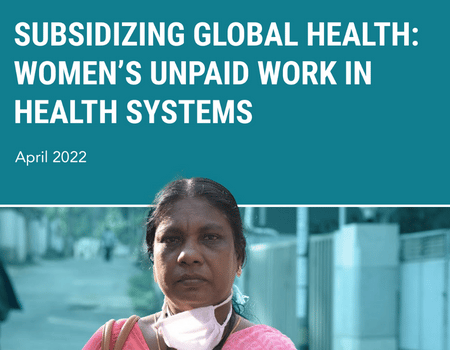Press release: Unpaid work violates women’s rights and threatens global health security
Six million women are currently subsidizing health systems
July 7, 2022 – Global health security and women’s rights are being undermined by the lack of payment or gross underpayment of women health workers, according to a new report from Women in Global Health.
“Subsidizing global health” found that upwards of six million women worldwide are subsidizing health systems with their unpaid or grossly underpaid labor.
“We know that women make up 90 percent of frontline health workers globally and there is a very clear connection between the failure to adequately pay health workers, mostly women and what’s being termed The Great Resignation of health workers, putting health systems under extreme stress,” said Dr Magda Robalo, Managing Director, Women in Global Health.
“Women would choose to be paid if they had that choice. Under paying or not paying them is not only a violation of economic justice, it is poor policy to engage a large proportion of your workforce under unacceptable working conditions. It is no wonder that so many are leaving the profession.”
The report – compiled from existing research and interviews with women health workers in Ethiopia, India, Malawi, Mexico and Zambia – found a serious absence of data about women working unpaid in health systems. At the start of the pandemic, some countries were unable to estimate their need for personal protective equipment (PPE) due to lack of data on the number of health workers delivering critical public health programs in communities.
“It seems a paradox that very poor women with heavy work commitments should agree to take on additional unpaid work in health systems,” said Ann Keeling, Senior Fellow with Women in Global Health and main author of the report.
“But opportunities for paid work for women may be limited by lack of mobility or cultural ideas of decent occupations for women – under these circumstances, even unpaid work may seem like an opportunity.”
The pandemic has exposed the magnitude of the ‘informal’ workforce in health, particularly in low income countries where female workers are often titled ‘volunteers’ or ‘community activists’ and generally unrecorded in formal labor market statistics.
The findings in “Subsidizing global health” mirror those of the Lancet Commission on Women and Health which calculated that women’s contribution to the global economy was $3 trillion, with half of that in the form of unpaid work.
It recommends that unpaid and underpaid workers working in core health systems roles need to be counted to reflect the true figure of health workers delivering services. Creating decent jobs for all women in the formal health workforce would address the projected 18 million gap that is threatening global health security. It would also have the wider benefit of increasing gender equality and women’s economic empowerment.
ENDS
For press enquiries, contact:
Joan Bolger – Women in Global Health
e: joan.bolger@womeningh.org t: +353 85-285-6977
EDITOR’S NOTES
- The Global Health and Care Compact Worker Compact drafted by WHO and passed by World Health Assembly May 2022 includes a commitment to: Provide equal pay for work of equal value, an important element of closing the health sector gender pay gap and recognizing the value of unpaid health and care work, including addressing provision of inadequate compensation for care workers, including community health workers.
- In May 2022, the US Government announced a new White House Global Health Worker Initiative with $1billion allocated for 2023
- Women in Global Health have launched an ongoing initiative with France, titled the Gender Equal Health and Care Workforce Initiative to make gender equity in the health workforce a top political priority for action. This initiative has since been joined by numerous governments, international organizations and NGOs.
About Women in Global Health
Women in Global Health (WGH) is the fast-growing women-led movement demanding gender equity in global health. While women represent 70% of the workforce and about 90 percent of front-line health workers, they hold just a quarter of leadership positions. Now with supporters in more than 90 countries and 41 official chapters predominantly in low-income countries, Women in Global Health campaigns for equal representation for women in health leadership; equitable pay and ending unpaid work for women health workers; protection and safe and decent work; and the prevention of sexual exploitation, abuse and harassment. These are the essential foundations for strong health systems, Universal Health Coverage and global health security.
Women in Global Health now has 41 Chapters in 36 countries, and expects to have 100 by 2023. With around 5,500 members and 70,000 supporters, we are nurses, midwives, doctors, public health professionals, health policy makers, community health workers, researchers, pharmacists and private sector health workers.
Women in Global Health has repeatedly called for a new social contract for women based on safe and decent work. The organization campaigns to address gender inequity as a systemic health care problem with grave impacts on health care delivery around the world. Its canon of evidence, such as today’s report, works to prove that investment in strong primary health care systems will pay off longer term in better health outcomes.

